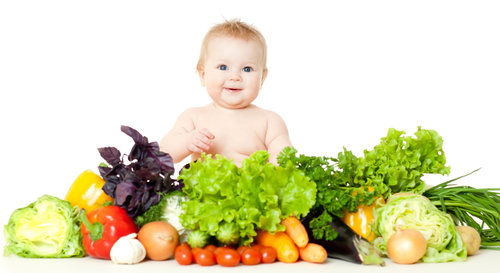Healthy eating for our children
Sunday, April 6th, 2014
As all parents know young children are always on the go and need a wide variety of foods for growth and health. The best way to ensure that your child is eating a balanced diet is to offer a wide range of different foods each day.
Cereals, bread and potatoes -These foods are high in carbohydrate and provide energy your child needs to be active and play. Include at least one serving at every mealtime.
Recommended servings per day:
1-3 years = 4 servings
3-5 years = 4-6+ servings
Fruit and vegetables are excellent sources of vitamins and minerals. If your child will not eat vegetables, offer more fruit instead, as both have similar nutritional values.
Recommended servings per day:
1-3 years: 2-4 servings
2-4 years: 4 or more servings
5 years onwards: 5 servings
Raw vegetables are often popular with children; remember to wash and peel before eating. Frozen vegetables are as good as fresh.
Milk, cheese and yoghurt -These foods are the best source of calcium, which is essential for bone development. Three servings a day are recommended.
Suggested servings:
ג¢ 1 glass of milk (200 mls)
ג¢ 1 carton of yoghurt
ג¢ 25g (1 oz) of hard cheese (size of matchbox)
ג¢ 2 cheese singles
ג¢ 1 yoghurt drink or 2 fromage frais
ג¢ Small bowl of milk pudding
Cheese, milk and yoghurt can be used in cooking without affecting the calcium content. Custard, cheese on toast or homemade pizza are popular ways to increase your child’s calcium intake. While milk is an important part of a child’s diet the amount consumed should not exceed one pint a day as large quantities of milk may reduce appetite and prevent your child from eating a mixture of foods that are necessary at this important time in their growth and development.
Meat, fish, poultry and eggs are good sources of protein which is essential for growth and development. Two servings a day are recommended. Pulses (peas, beans, lentils) also provide protein.
Iron -Red meat (lamb, beef, pork) and chicken are excellent sources of easily absorbed iron. The iron in meat is absorbed up to seven times more easily than the iron from vegetables, cereals and fruits. Meat also helps to increase the absorption of iron from vegetables eaten at the same meal. Children have high iron requirements and should be encouraged to eat meat on a regular basis
Tips for Fussy eaters
ג¢ Try to create a relaxed atmosphere at meal times.
ג¢ Provide small, easy to handle portions and offer seconds; too much food on a plate may look unappetising.
ג¢ Introduce new foods along with a food you know your child likes; if the new food is refused try again a few weeks later.
ג¢ Make food look interesting, different colours and shapes appeal to children so combine a variety of colourful foods e.g. carrots, sweet corn, potato and stew.
ג¢ Offer finger foods to younger children to allow them to feed themselves e.g. a stick of raw carrot, sliced apple, a cheese triangle or finger of toast.
ג¢ Involve your child in food preparation, shopping and washing up.
ג¢ In general, try to buy only the foods you want your child to eat.
ג¢ Never force your child to clear his/her plate or eat foods he/she does not like.
ג¢ Don’t give chopped or whole nuts to children under five because of the risk of choking. In families with a history of allergies (asthma, hay fever, eczema) additional advice regarding the introduction of nuts may be necessary. Consult your GP for advice.

